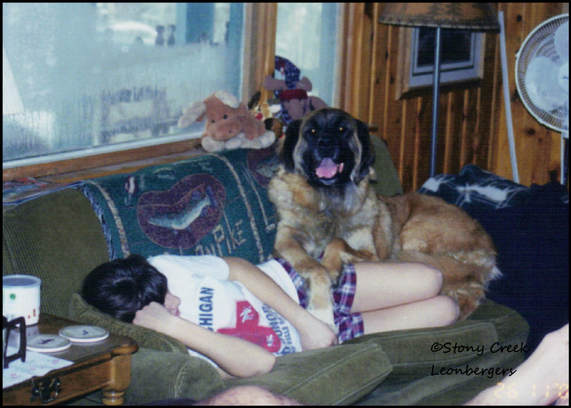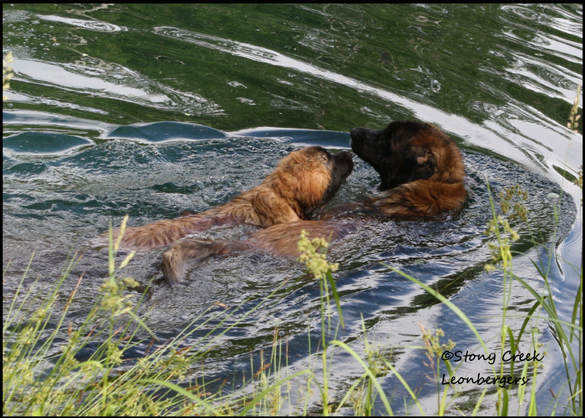Is the Leonberger For You?
Most Leonbergers are wonderful, loving dogs...but due to their size and strength, they are NOT the dog for everyone. They require time, dedication, grooming and above all...training to ensure a well-behaved dog. Buying any dog should be a lifetime commitment, so make sure that you learn about the Leonberger before you buy.
Please consider the following guidelines:
Don't buy a Leonberger if you don't want to share your home (not just your yard) with your dog. They are devoted to their people and want to be with you as much as possible. They are likely to behave badly to alleviate their boredom - digging, chewing, barking, etc. They will tolerate being left home by themselves for short periods, as long as they spend time with you when you are home.
Most Leonbergers are wonderful, loving dogs...but due to their size and strength, they are NOT the dog for everyone. They require time, dedication, grooming and above all...training to ensure a well-behaved dog. Buying any dog should be a lifetime commitment, so make sure that you learn about the Leonberger before you buy.
Please consider the following guidelines:
Don't buy a Leonberger if you don't want to share your home (not just your yard) with your dog. They are devoted to their people and want to be with you as much as possible. They are likely to behave badly to alleviate their boredom - digging, chewing, barking, etc. They will tolerate being left home by themselves for short periods, as long as they spend time with you when you are home.
Don't buy a Leonberger if you have only seen them at shows - with glistening coats, dry and fluffy. The Leonberger's true nature is to romp and swim outdoors. They thrive on being wet and don't mind mud at all. Their natural look is slightly damp with leaves stuck to their coats.
Don't buy a Leonberger if you don't want to spend the time to train your dog. Although they are called "Gentle Giants", they do go through a very stubborn adolescent stage. It's imperative to teach them to respect and honor you and your rules at this point - if you don't, you will have a 100+ pound canine that does not know how to behave to make you happy (they may take food from the table because they can, sleep on the couch or your bed when full of mud, or take off chasing a cat down the street with you attached to the other end of the leash).
They want to please you, but they need guidance from you to know how. This requires committing to at least a puppy kindergarten course, as well as basic obedience classes before the dog is one year old. It is essential to do 1-2 short (10 minute) homework sessions every day during their first two years of life, as well as incorporating the lessons into your daily life as often as possible. This training cannot be delegated to someone else (e.g., boarding school) because the relationship of respect and obedience is personal between the dog and the person doing the training. As each lesson is learned, the rest of the household must also work with the dog, ensuring that they are obeyed as well.
Don't buy a Leonberger if you are a fastidious housekeeper. They have long fur that tends to be everywhere. They shed mainly twice a year (in large quantities), but there is always some fur in the corners. They adore being wet and muddy - that means wiping four paws every time they come in from outside unless you don't mind the occasional muddy paw print. Their coats usually look and smell clean which means that the mud and muck that they love to play in has come off on your floors, and oftentimes walls and furniture, as well. Their tails are at the perfect height to sweep the coffee table knickknacks right off. Although they don't drool, they are not the most efficient about closing their mouths after drinking water, or eating. They may dribble food or water across your freshly mopped floors.
Don't buy a Leonberger if you are unwilling to attend to their basic health and grooming needs. They need to be examined by a veterinarian every 3 weeks until they are 4 months old, and then at least once a year. They need a good brushing and nail trimming once a week. If you don't want to use this time to bond with your dog or are unable to do this yourself, be prepared to spend the extra money to have your local groomer or veterinarian do it. They need daily checks for ticks and foxtails when these health risks are in season. Unless you provide them with large raw bones to keep their teeth clean, or brush their teeth daily, they will need periodic dental care from a veterinarian.
Don't buy a Leonberger if you cannot afford to buy, feed, and provide healthcare for one. The care that goes into keeping the Leonberger breed sound and healthy cannot be done cheaply; therefore, they are relatively expensive dogs. They are large dogs, which means that the monthly food bills are considerable. (This also means that the yard pick-up chore is sometimes considerable). Spaying and neutering, as well as any other type of surgery, are more expensive for large dogs because the anesthesia charge is proportional to body weight. Actually, almost everything seems to be a little more expensive (crates, dog beds, food bowls, etc. for large dogs than smaller ones).
Don't buy a Leonberger if you don't want to spend the time to train your dog. Although they are called "Gentle Giants", they do go through a very stubborn adolescent stage. It's imperative to teach them to respect and honor you and your rules at this point - if you don't, you will have a 100+ pound canine that does not know how to behave to make you happy (they may take food from the table because they can, sleep on the couch or your bed when full of mud, or take off chasing a cat down the street with you attached to the other end of the leash).
They want to please you, but they need guidance from you to know how. This requires committing to at least a puppy kindergarten course, as well as basic obedience classes before the dog is one year old. It is essential to do 1-2 short (10 minute) homework sessions every day during their first two years of life, as well as incorporating the lessons into your daily life as often as possible. This training cannot be delegated to someone else (e.g., boarding school) because the relationship of respect and obedience is personal between the dog and the person doing the training. As each lesson is learned, the rest of the household must also work with the dog, ensuring that they are obeyed as well.
Don't buy a Leonberger if you are a fastidious housekeeper. They have long fur that tends to be everywhere. They shed mainly twice a year (in large quantities), but there is always some fur in the corners. They adore being wet and muddy - that means wiping four paws every time they come in from outside unless you don't mind the occasional muddy paw print. Their coats usually look and smell clean which means that the mud and muck that they love to play in has come off on your floors, and oftentimes walls and furniture, as well. Their tails are at the perfect height to sweep the coffee table knickknacks right off. Although they don't drool, they are not the most efficient about closing their mouths after drinking water, or eating. They may dribble food or water across your freshly mopped floors.
Don't buy a Leonberger if you are unwilling to attend to their basic health and grooming needs. They need to be examined by a veterinarian every 3 weeks until they are 4 months old, and then at least once a year. They need a good brushing and nail trimming once a week. If you don't want to use this time to bond with your dog or are unable to do this yourself, be prepared to spend the extra money to have your local groomer or veterinarian do it. They need daily checks for ticks and foxtails when these health risks are in season. Unless you provide them with large raw bones to keep their teeth clean, or brush their teeth daily, they will need periodic dental care from a veterinarian.
Don't buy a Leonberger if you cannot afford to buy, feed, and provide healthcare for one. The care that goes into keeping the Leonberger breed sound and healthy cannot be done cheaply; therefore, they are relatively expensive dogs. They are large dogs, which means that the monthly food bills are considerable. (This also means that the yard pick-up chore is sometimes considerable). Spaying and neutering, as well as any other type of surgery, are more expensive for large dogs because the anesthesia charge is proportional to body weight. Actually, almost everything seems to be a little more expensive (crates, dog beds, food bowls, etc. for large dogs than smaller ones).
Don't buy a Leonberger if you don't like daily exercise. They need to have at least 2 half hour daily walks, or one of about an hour, every day. They thrive on play sessions with other dogs, but are perfectly happy to play with you. Most Leonbergers love to swim and including water in their daily exercise keeps them very happy. Exercising your dog well will prevent a lot of problems that can occur when dogs are bored and have no outlet for their energy. Even a well-trained dog will misbehave when they don't receive enough exercise (excessive barking, charging fences, jumping up on people, digging, chewing inappropriately, etc.)
Don't buy a Leonberger if you are not willing to answer the "What kind of dog is that?" question at least 20 times/week (sometimes 20 times/walk).
Don't buy a Leonberger if you don't believe in providing them with a home for their entire lifetime. Be sure to contact your breeder with any questions or problems in raising your Leonberger to be the companion dog that he/she was meant to be. Make sure to make arrangements for your dog if you should pre-decease him/her or become terminally ill.

